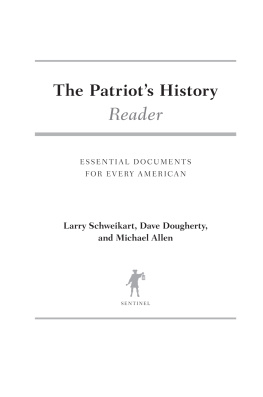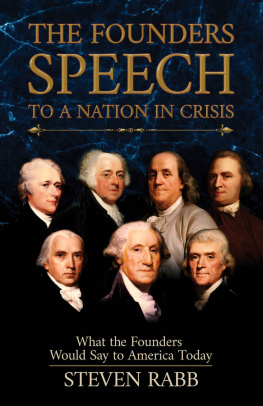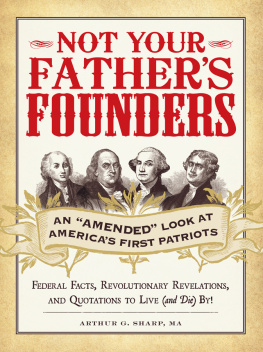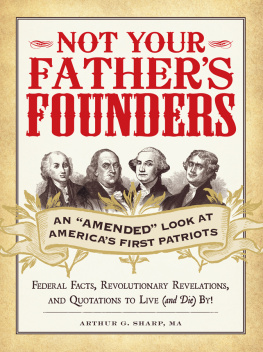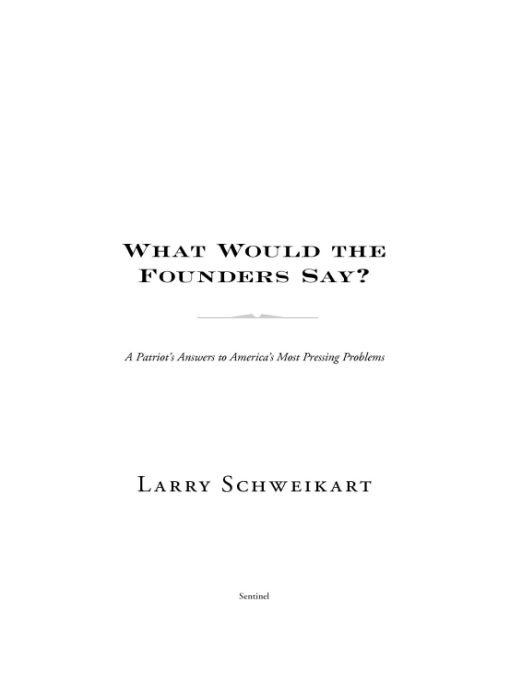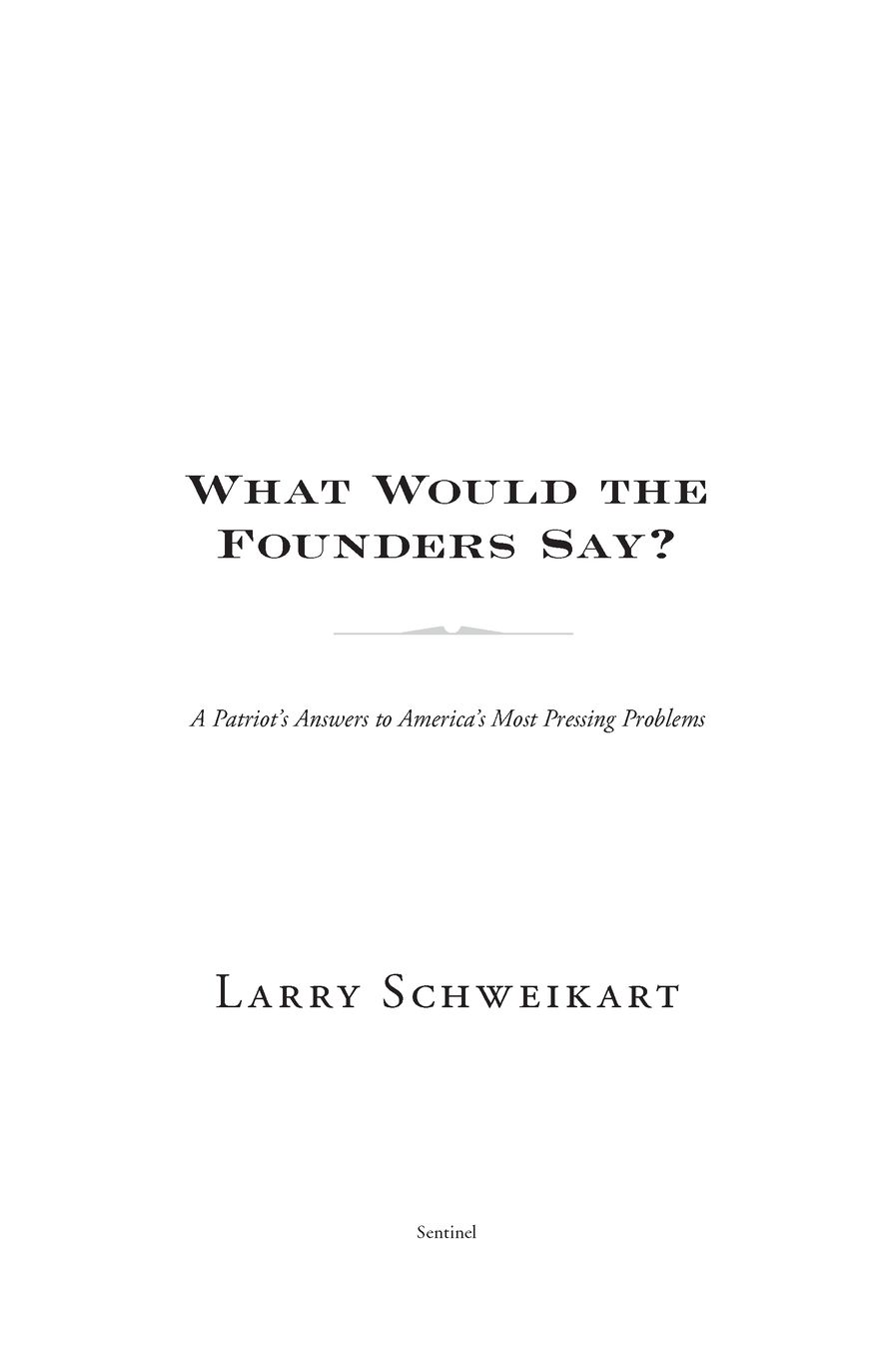Table of Contents
ALSO BY LARRY SCHWEIKART
Seven Events That Made America America
48 Liberal Lies About American History
Americas Victories
A Patriots History of the United States with Michael Allen
To Donald Douglas Dalgleish, mentor and friend
INTRODUCTION
In February 2009, when the Democrat-dominated U.S. Congress, with the blessing of newly inaugurated President Barack Obama, hurled more than $787 billion at the U.S. recession in an effort to stimulate job growth, the results were unexpected, to say the least. Almost immediatelythanks to comments by Rick Santelli of CNBC, who called for a new tea party to stop the spending and taxesspontaneous public gatherings throughout the nation demanded a change of course. The government is promoting bad behavior, Santelli said. What was needed was a referendum on whether to reward bad behavior: How many of you want to pay for your neighbors mortgage, who has an extra bathroom and cant pay their bills? he asked a group of traders in a speech on the floor of the Chicago Board of Trade. The traders booed. Santelli noted that Cuba used to have mansions and a relatively decent economy, but they moved from the individual to the collective.... Were thinking of having a tea party in July!
Santellis words instantly connected with millions of Americans (certainly by most polls, a majority) who thought that the so-called stimulus bill, often called the porkulus bill for all the pet projects it contained, was not only unnecessary but represented everything that was wrong with American government. This included too much regulation, too much spending, and, above all, too much taxation. The tea in tea party, in fact, stood for taxed enough already. Without any significant funding from any established political party or organization, tea parties consisting of Democrats, Republicans, and nonaligned voters organized so rapidly that on April 15tax daymass demonstrations took place across the nation with hundreds of thousands turning out. Dayton, Ohio, a city of about 250,000, which had seen several major corporations shut their doors in the previous few years, saw 8,000 gather downtown in Courthouse Square. Other tea parties numbered far more.
While Santelli had provided the energizing phrase that seemed to capture the moment, the grievances of the participants were broad and deep. April 15 tea party speeches repeatedly invoked the Constitution, with orators demanding to know where the authority existed for Obama and Congress to create jobs in the first place. Where did the Constitution allow government to advocate one type of activity and investment (e.g., green jobs) over another? Why did anyone think that government had authority over the environment, much less the global climate? Still other issues lurked beneath the surface of the speeches. If a government had power to seize wealth on such a wide scale, and to distribute it with such blatant partisanship and lack of debate, what other power would it claim? After all, many (if not most) of those voting for the porkulus bill had never read it and cheerfully admitted as much. Uncontrolled spending by the Republican Congress prior to 2006 had contributed to growing dissatisfaction with the GOP and permitted a Democratic takeover of the House and Senate that year. Yet instead of controlling expenditures, the Democrats went on a spree that would have made drunken sailors look thrifty.
Before Obama even took officebut with his complete blessing and encouragementRepublican President George W. Bush and the Democratic Congress had staged a massive bailout of the major U.S. investment banks, pouring $700 billion into propping up troubled banks by purchasing mortgage-backed securities through the Troubled Asset Recovery Program (TARP). Then, when problems spread from banks to the auto industry, Congress (with the blessing of the incoming president) doled out a titanic bailout of General Motors (GM) and Chrysler Corporation in the name of saving jobs. Few failed to notice the irony that GMs government-approved plan included cutting thirty-one thousand jobs! echoing a sentiment from the Great Depression that somehow by engaging in a light form of fascism, Franklin D. Roosevelt had saved capitalism.
But matters were, in reality, far worse. Anyone who had followed Barack Obamas campaign and the actions of the House and Senate since 2006, before they had two-thirds majorities, knew exactly what their agenda was after the 2008 elections. Democratic leaders had promised a national health-care program, cap and trade that would supposedly battle global warming, and immigration reform that basically allowed for general amnesty. Then there was the fairness doctrine, designed to limit opposing voices in radio and on television; net neutrality, which promised to regulate the Internet so as to prevent, ultimately, individuals from frequenting Web sites that might disagree with an administration; and new public health regulations against salt, fat, meat, sugar, and a host of other food items.
During his campaign, Obama had told Joe the Plumber Wurzelbacher, an Ohio resident who challenged the candidates small-business tax policy, that he wanted to spread the wealth around. Was this within the authority of a president? After taking the oath of office, Obama noted that the United States was not a Christian nation. Really? Would most Americans have agreed with that sentiment? Obama had moved far from tolerance of Islam to embracing it, taking every opportunity to praise the religion, leading many to fear that after prayer had long been banned in schools, favorable references to Christianity would be next. While such concerns were dismissed by the mainstream media as kooky, they appeared all too plausible given the recent drift in Washington. It seemed that many of the extreme ideas in Washington originated in the public education system, which had taken on a distinct agenda. Schools had become hugely political, with the introduction of classroom materials such as Heather Has Two Mommies and curricula sympathetic to homosexual rights groups and hostile to traditional families. Global warming and other unproven environmental doctrines were routinely taught as fact, and young students were urged to think globally, act locally. Educators and politicians alike consistently undermined American concepts of sovereignty.
Throughout it all, the tea parties objected on the grounds that none of these things were constitutionalthat the Founders never intended for any of these trends to develop. The tea parties were not the first to spark renewed inquiry into our founding documents and the ideas of the Founders themselves, but they certainly served as a catalyst for the widespread revival of interest in what the Founders thought, dreamed, and would have tolerated. What would George Washington have thought about the governments involvement in the global warming debate? How about Thomas Jefferson? Would he have had a position on the bailout of General Motors? Surely Alexander Hamilton or Benjamin Franklin would have had an opinion on national health care. Whats that? you say. The Founders never mentioned any of these things? Of course, you would be right for two reasons, the most obvious being that such issues did not exist two centuries ago when the Founders were living. The second reason is that



